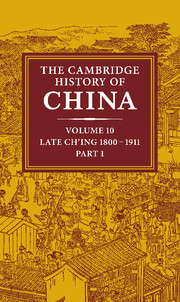Book contents
- Frontmatter
- 1 Introduction: the old order
- 2 Ch'ing Inner Asia c. 1800
- 3 Dynastic decline and the roots of rebellion
- 4 The Canton trade and the Opium War
- 5 The creation of the treaty system
- 6 The Taiping Rebellion
- 7 Sino-Russian relations, 1800–62
- 8 The heyday of the Ch'ing order in Mongolia, Sinkiang and Tibet
- 9 The Ch'ing Restoration
- 10 Self-strengthening: the pursuit of Western technology
- 11 Christian missions and their impact to 1900
- Bibliographical essays
- Bibliography
- Genealogical chart
- Glossary
- Index
- References
1 - Introduction: the old order
Published online by Cambridge University Press: 28 March 2008
- Frontmatter
- 1 Introduction: the old order
- 2 Ch'ing Inner Asia c. 1800
- 3 Dynastic decline and the roots of rebellion
- 4 The Canton trade and the Opium War
- 5 The creation of the treaty system
- 6 The Taiping Rebellion
- 7 Sino-Russian relations, 1800–62
- 8 The heyday of the Ch'ing order in Mongolia, Sinkiang and Tibet
- 9 The Ch'ing Restoration
- 10 Self-strengthening: the pursuit of Western technology
- 11 Christian missions and their impact to 1900
- Bibliographical essays
- Bibliography
- Genealogical chart
- Glossary
- Index
- References
Summary
HISTORY AND CHINA'S REVOLUTION
The history of modern China – what is now thought to have happened there – is full of controversy. Major events are known but their significance is disputed. Meanwhile many minor events remain unknown or disregarded.
The first cause of controversy is widespread historical ignorance due to the lack of a generally accepted body of research and writing in this under-developed field. I say ‘historical ignorance’ because the task of history is to understand the circumstances, motives and actions of all parties concerned, and an unbalanced knowledge, of one side only, may leave us still quite ignorant of the other side in a conflict, and therefore less able to comprehend it.
For example, British documents on the Opium War of 1840-2 were published extensively at the time, but Chinese documents not until ninety years later, in 1932. Moreover, the documents of both sides give primarily official points of view; the wartime experience of ordinary Chinese people was less well recorded and has been less studied. Even this seemingly well known event is still imperfectly understood. For instance, how far were Chinese local people merely passive spectators of Anglo-Ch'ing hostilities? How far were they moved to patriotic resistance? Opinions and instances differ.
A second cause of controversy is the broad cultural gap that separated the major historical protagonists – not only the cultural differences in language, thought, and values between the foreign invaders of China and the resistant Chinese ruling class in the nineteenth century, but also the similar differences between that ruling class and the great mass of the Chinese people, once they became revolutionary in the twentieth century.
- Type
- Chapter
- Information
- The Cambridge History of China , pp. 1 - 34Publisher: Cambridge University PressPrint publication year: 1978
References
- 7
- Cited by

